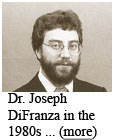The Programs (cont'd.)
The site began accepting residents as early as 1975, but the program's provisional status delayed residents' formally graduating there until four years later. Babineau stayed on with the practice until his retirement in 1986 and was the principal architect of its philosophy and policies for many years. It was, and is, administered from its home site in the city of Fitchburg. As a site located about twenty miles north of Worcester with a medium-size teaching hospital, today called HealthAlliance (the Burbank campus) with an active Family Medicine inpatient service in nearby Leominster, the site provides residents with an experience that encompasses a full range of practice experiences, especially focusing on the health needs of a predominantly blue collar, manufacturing community. From the first year of the residency, the program offered its own Balint group, run until 2006 by psychologist Joe Mendola, which is still in operation.(80)
Since 1978, it has been a fully accredited, three-year program, like the Worcester program, with a separate selection and matching process. According to its own documents, it was organized as a "partnership" among the medical school, University Hospital, the Burbank Hospital in Fitchburg, and the Fitchburg Family Practice. In-patient training takes place primarily at the University Hospital and Burbank Hospital in Leominster. Memorial and Berkshire Medical Center add some on-site experiences. According to a description from January, 1981, "Burbank Hospital has established a Family Practice service … comprised of family physicians who are teachers and role models. The establishment of this service is unique in a state where often [Family Medicine] residents are taught by other specialists in the hospital setting." Ambulatory training took place at Fitchburg Family Practice.(81)
Dr. Babineau recalled the early years of the program this way:
In the Fitchburg program, we were using the Burbank Hospital, which was a community hospital and the only other residents at the Burbank were surgical residents who came from the Peter Bent Brigham. They weren't there full time, they would rotate through on a three-month basis and at any one time we probably had two surgical residents there working. And one of the problems I dealt with and could never resolve was to get the full support of the Burbank Hospital behind the Family Practice residency. They, I don't think, ever bought the idea. But we used it to train our residents and we got the cooperation of the staff, so that we used it to do our OB training, our internal medicine training, our pediatric training, so most of our residents went through the Burbank. And the support varied a great deal from staff member to staff member. But overall, I think, we wanted our program designed so that our residents could go out and do a broad type of medicine, which included obstetrics. This was always the big debate. We didn't expect them to do surgery except perhaps to assist, but they would be trained in medicine, pediatrics, AND obstetrics, because I felt strongly at that time, because I did lots of obstetrics. … So I wanted obstetrics to be part of our program because I felt that, if you're going to be a family doctor, what's a better way to know the family, than to be able to know the mother and carry her through her pregnancy and take care of the children?(82)
Yet with so much clinical training, the site still produced what has proved to be one of the major clinical research programs in the
 history of the department of Family Medicine and Community Health, Dr. Joe DiFranza's smoking cessation studies. Babineau proudly
reminded us that DiFranza, "was with us at Fitchburg. He went through the residency, I think, at Hahnemann. And then
he came and was part of the faculty at Fitchburg with us for a few years, I think he was with us until I retired. And he started his
smoking study with us. I think this was in the early to mid 80s."(83)
history of the department of Family Medicine and Community Health, Dr. Joe DiFranza's smoking cessation studies. Babineau proudly
reminded us that DiFranza, "was with us at Fitchburg. He went through the residency, I think, at Hahnemann. And then
he came and was part of the faculty at Fitchburg with us for a few years, I think he was with us until I retired. And he started his
smoking study with us. I think this was in the early to mid 80s."(83)
